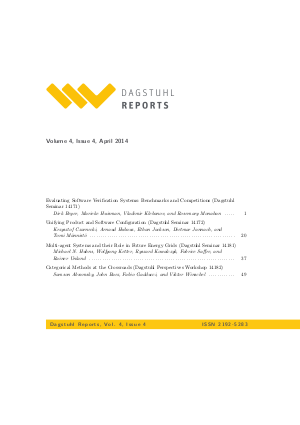Dagstuhl Reports, Volume 4, Issue 4
-
Part of:
Volume:
Dagstuhl Reports, Volume 4
Journal: Dagstuhl Reports (DagRep)

Event
- Dagstuhl Seminars 14171, 14172, 14181, 14182 (Perspectives Workshop)
Publication Details
- published at: 2014-11-06
- Publisher: Schloss Dagstuhl – Leibniz-Zentrum für Informatik
- DBLP: db/journals/dagstuhl-reports/dagstuhl-reports4
Access Numbers
- Detailed Access Statistics available here
-
Total Document Accesses (updated on a weekly basis):
0PDF Downloads
Documents
Dagstuhl Reports, Volume 4, Issue 4, April 2014, Complete Issue
Abstract
Cite as
Dagstuhl Reports, Volume 4, Issue 4, Schloss Dagstuhl – Leibniz-Zentrum für Informatik (2014)
Copy BibTex To Clipboard
@Article{DagRep.4.4,
title = {{Dagstuhl Reports, Volume 4, Issue 4, April 2014, Complete Issue}},
journal = {Dagstuhl Reports},
ISSN = {2192-5283},
year = {2014},
volume = {4},
number = {4},
publisher = {Schloss Dagstuhl -- Leibniz-Zentrum f{\"u}r Informatik},
address = {Dagstuhl, Germany},
URL = {https://drops.dagstuhl.de/entities/document/10.4230/DagRep.4.4},
URN = {urn:nbn:de:0030-drops-47968},
doi = {10.4230/DagRep.4.4},
annote = {Keywords: Dagstuhl Reports, Volume 4, Issue 4, April 2014, Complete Issue}
}
Dagstuhl Reports, Table of Contents, Volume 4, Issue 4, 2014
Abstract
Cite as
Dagstuhl Reports, Volume 4, Issue 4, pp. i-ii, Schloss Dagstuhl – Leibniz-Zentrum für Informatik (2014)
Copy BibTex To Clipboard
@Article{DagRep.4.4.i,
title = {{Dagstuhl Reports, Table of Contents, Volume 4, Issue 4, 2014}},
pages = {i--ii},
journal = {Dagstuhl Reports},
ISSN = {2192-5283},
year = {2014},
volume = {4},
number = {4},
publisher = {Schloss Dagstuhl -- Leibniz-Zentrum f{\"u}r Informatik},
address = {Dagstuhl, Germany},
URL = {https://drops.dagstuhl.de/entities/document/10.4230/DagRep.4.4.i},
URN = {urn:nbn:de:0030-drops-47957},
doi = {10.4230/DagRep.4.4.i},
annote = {Keywords: Table of Contents, Frontmatter}
}
Evaluating Software Verification Systems: Benchmarks and Competitions (Dagstuhl Reports 14171)
Abstract
Cite as
Dirk Beyer, Marieke Huisman, Vladimir Klebanov, and Rosemary Monahan. Evaluating Software Verification Systems: Benchmarks and Competitions (Dagstuhl Reports 14171). In Dagstuhl Reports, Volume 4, Issue 4, pp. 1-19, Schloss Dagstuhl – Leibniz-Zentrum für Informatik (2014)
Copy BibTex To Clipboard
@Article{beyer_et_al:DagRep.4.4.1,
author = {Beyer, Dirk and Huisman, Marieke and Klebanov, Vladimir and Monahan, Rosemary},
title = {{Evaluating Software Verification Systems: Benchmarks and Competitions (Dagstuhl Reports 14171)}},
pages = {1--19},
journal = {Dagstuhl Reports},
ISSN = {2192-5283},
year = {2014},
volume = {4},
number = {4},
editor = {Beyer, Dirk and Huisman, Marieke and Klebanov, Vladimir and Monahan, Rosemary},
publisher = {Schloss Dagstuhl -- Leibniz-Zentrum f{\"u}r Informatik},
address = {Dagstuhl, Germany},
URL = {https://drops.dagstuhl.de/entities/document/10.4230/DagRep.4.4.1},
URN = {urn:nbn:de:0030-drops-46157},
doi = {10.4230/DagRep.4.4.1},
annote = {Keywords: Formal Verification, Deductive Verification, Automatic Verification, Theorem Proving, Model Checking, Program Analysis, Competition, Comparative Eval}
}
Unifying Product and Software Configuration (Dagstuhl Seminar 14172)
Abstract
Cite as
Krzysztof Czarnecki, Arnaud Hubaux, Ethan Jackson, Dietmar Jannach, and Tomi Männistö. Unifying Product and Software Configuration (Dagstuhl Seminar 14172). In Dagstuhl Reports, Volume 4, Issue 4, pp. 20-35, Schloss Dagstuhl – Leibniz-Zentrum für Informatik (2014)
Copy BibTex To Clipboard
@Article{czarnecki_et_al:DagRep.4.4.20,
author = {Czarnecki, Krzysztof and Hubaux, Arnaud and Jackson, Ethan and Jannach, Dietmar and M\"{a}nnist\"{o}, Tomi},
title = {{Unifying Product and Software Configuration (Dagstuhl Seminar 14172)}},
pages = {20--35},
journal = {Dagstuhl Reports},
ISSN = {2192-5283},
year = {2014},
volume = {4},
number = {4},
editor = {Czarnecki, Krzysztof and Hubaux, Arnaud and Jackson, Ethan and Jannach, Dietmar and M\"{a}nnist\"{o}, Tomi},
publisher = {Schloss Dagstuhl -- Leibniz-Zentrum f{\"u}r Informatik},
address = {Dagstuhl, Germany},
URL = {https://drops.dagstuhl.de/entities/document/10.4230/DagRep.4.4.20},
URN = {urn:nbn:de:0030-drops-46162},
doi = {10.4230/DagRep.4.4.20},
annote = {Keywords: Product Configuration, Software Product Lines, Configuration Management}
}
Multi-agent systems and their role in future energy grids (Dagstuhl Seminar 14181)
Abstract
Cite as
Michael N. Huhns, Wolfgang Ketter, Ryszard Kowalczyk, Fabrice Saffre, and Rainer Unland. Multi-agent systems and their role in future energy grids (Dagstuhl Seminar 14181). In Dagstuhl Reports, Volume 4, Issue 4, pp. 37-48, Schloss Dagstuhl – Leibniz-Zentrum für Informatik (2014)
Copy BibTex To Clipboard
@Article{huhns_et_al:DagRep.4.4.37,
author = {Huhns, Michael N. and Ketter, Wolfgang and Kowalczyk, Ryszard and Saffre, Fabrice and Unland, Rainer},
title = {{Multi-agent systems and their role in future energy grids (Dagstuhl Seminar 14181)}},
pages = {37--48},
journal = {Dagstuhl Reports},
ISSN = {2192-5283},
year = {2014},
volume = {4},
number = {4},
editor = {Huhns, Michael N. and Ketter, Wolfgang and Kowalczyk, Ryszard and Saffre, Fabrice and Unland, Rainer},
publisher = {Schloss Dagstuhl -- Leibniz-Zentrum f{\"u}r Informatik},
address = {Dagstuhl, Germany},
URL = {https://drops.dagstuhl.de/entities/document/10.4230/DagRep.4.4.37},
URN = {urn:nbn:de:0030-drops-46179},
doi = {10.4230/DagRep.4.4.37},
annote = {Keywords: Multiagent Systems, Demand-Side Management, Smart Grid, Eneregy Distribution}
}
Categorical Methods at the Crossroads (Dagstuhl Perspectives Workshop 14182)
Abstract
Cite as
Samson Abramsky, John C. Baez, Fabio Gadducci, and Viktor Winschel. Categorical Methods at the Crossroads (Dagstuhl Perspectives Workshop 14182). In Dagstuhl Reports, Volume 4, Issue 4, pp. 49-63, Schloss Dagstuhl – Leibniz-Zentrum für Informatik (2014)
Copy BibTex To Clipboard
@Article{abramsky_et_al:DagRep.4.4.49,
author = {Abramsky, Samson and Baez, John C. and Gadducci, Fabio and Winschel, Viktor},
title = {{Categorical Methods at the Crossroads (Dagstuhl Perspectives Workshop 14182)}},
pages = {49--63},
journal = {Dagstuhl Reports},
ISSN = {2192-5283},
year = {2014},
volume = {4},
number = {4},
editor = {Abramsky, Samson and Baez, John C. and Gadducci, Fabio and Winschel, Viktor},
publisher = {Schloss Dagstuhl -- Leibniz-Zentrum f{\"u}r Informatik},
address = {Dagstuhl, Germany},
URL = {https://drops.dagstuhl.de/entities/document/10.4230/DagRep.4.4.49},
URN = {urn:nbn:de:0030-drops-46189},
doi = {10.4230/DagRep.4.4.49},
annote = {Keywords: Category theory, concurrency, economics, game theory, logics, quantum computing, semantics}
}